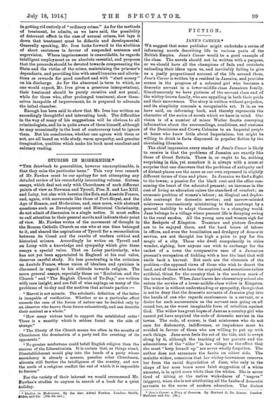STUDIES IN MODERNISM.*
°TEE drawback to generalities, however unexceptionable, is that they miss the particular issue." This very true remark of Mr. Fawkes must be our apology for not attempting any detailed review of his remarkably interesting volume. Sixteen essays, which deal not only with Churchmen of such different points of view as Newman and Tyrrell, Pius X. and Leo XIII. and Loisy, but also with heretics like Zola and. Anatole France, and, again, with movements like those of Port-Royal, and the Age of Reason, and Modernism, and, once more, with abstract questions such as Development and Historical Christianity, do not admit of discussion in a single notice.. It must suffice to call attention to their general merits and indicate their point of view. Mr. Fawkes writes of the movement of thought in the Roman Catholic Church as one who at one time belonged to it, and shared the aspirations of Tyrrell for a reconciliation between its Creed and the results of modern critical and historical science. Accordingly he writes on Tyrrell and on Loisy with a knowledge and sympathy which give these essays a special value. That on Loisy particularly, who has not yet been appreciated in England at his real value, deserves careful study. No less penetrating is the criticism on Anatole France, whose union of idealism and cynicism is discussed in regard to his attitude towards religion. The more general essays, especially those on "Evolution and the Church" and " The English Church of To-Day," are written with rare insight, and are full of wise sayings on many of the problems of to-day and the motives that actuate parties
"Marvel is not miracle. The scholastic definition of the latter is incapable of verification. Whether or no a particular effect exceeds the sum of the forces of nature can be decided only by an observer who knows those forces exhaustively, and can describe their content as a whole."
"How many virtues tend to support the established order ! There is a sanctity which is seldom found on the side of change."
" The liberty of the Church means too often in the mouths of Churchmen the domination of a party and the crushing of its opponents."
" No greater misfortune could befall English religion than the success of the Liberationists. It is certain that, as things stand, Disestablishment would play into the hands of a party whose ascendancy is already a menace, penalise sober Churchmen, alienate still further the intelligence- of the country, and sow the seeds of a religious conflict the end of which it is impossible to foresee."
For the variety of their interest we would recommend Mr. Wawkes's studies to anyone in search of a book for a quiet holiday.
Studies in Mo&rnism. By the Bev. Alfred Fawkes. London: Smith, Sider and co. [10e. 6.1. net.










































 Previous page
Previous page